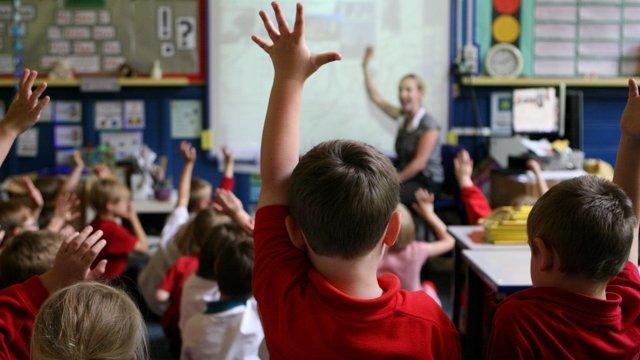'Difficult climate' for language teaching, study finds
- Published

While almost all England's primary schools teach foreign languages, there are problems encouraging continued study
Language teaching is facing a "difficult climate" in England's schools, researchers say.
A report by the CfBT Education Trust and the British Council highlights low uptakes of language GCSEs and A-levels as particular concerns.
It found that language teachers felt attracting pupils to study languages after the age of 16 was a "challenge".
The Department for Education said the number of pupils taking languages at GCSE was increasing.
This year's Language Trends Survey is the 13th annual research exercise to measure the condition of language teaching and learning in schools in England.
It is based on an online survey completed by teachers in more than 500 state secondary schools, 600 state primary schools and 120 independent secondary schools across the country.
Spanish and Mandarin
It does find some positive developments, including the fact that almost half of primary schools are introducing pupils in Key Stage 1 to a language, even though this is not a statutory requirement, and that 99% of primary schools now offer languages.
There has been an increase in the number of pupils studying Spanish at GCSE and A-level - but this increase has not fully compensated for declines in French, German and other languages.
There has also been a "modest increase" - from a low base - in the number of schools offering Mandarin Chinese, a language the report says is "recognised as crucial to the UK's long-term competitiveness".
The report's co-author, Teresa Tinsley, said it was encouraging to see how primary schools were "warmly embracing" statutory language teaching, making sure that "discovering the delight of new languages and cultures is firmly anchored into everything that children learn in primary schools".
"But our survey shows that secondary teachers are under increasing pressure with exams and performance measures that don't work well for languages," she said.
The report concludes that the prioritisation of maths and science is hitting languages in secondary schools.
It says that, in spite of calls for a greater knowledge of language skills from the the business sector, there is a persistent and widely held belief that languages are not as important as maths and science subjects.
"We need to give both teachers and pupils more credit for tackling languages and focus on the long-term benefits of being able to speak another language," Ms Tinsley said.
Another factor is "a growing trend" - particularly in state schools - to excuse pupils from the study of a language for reasons which include extra tuition in literacy and numeracy, a trend the report says is linked to "socio-economic disadvantage".
The study found marked regional variations across England in the take-up of languages.
In Middlesbrough only a quarter of pupils take a language GCSE, while three-quarters do so in the London Borough of Barnet.
Nine of the 10 local authorities with the highest proportions of pupils taking a language at GCSE are in London.
The researchers also found doubts among secondary teachers about the ability of primary schools to deliver "a worthwhile level" of language knowledge that pupils could apply when they moved on to study for GCSEs.
The research is backed by the British Council.
Its chief executive, Ciaran Devane, believes the UK's "current lack of language skills" is a serious impediment to future prosperity.
"Language learning in schools is not doomed," he said, "but it will require a combined and concerted effort to give language learning back the respect and prominence it deserves within society as a whole.
"No-one ever says that they regret having learned a language."
The Department for Education said the ability to speak foreign languages was valued by employers and helped pupils to understand different cultures and countries.
A spokeswoman added: "We have made languages a compulsory part of the national curriculum at primary school to lay the foundation for further language study in secondary school and we are pleased the report recognises the wider, positive impacts of this reform.
"We want to see that trend continue into secondary school and are already seeing encouraging signs following the introduction of the Ebacc, with thousands more pupils studying languages to GCSE, a number we expect to rise."
- Published27 February 2015
